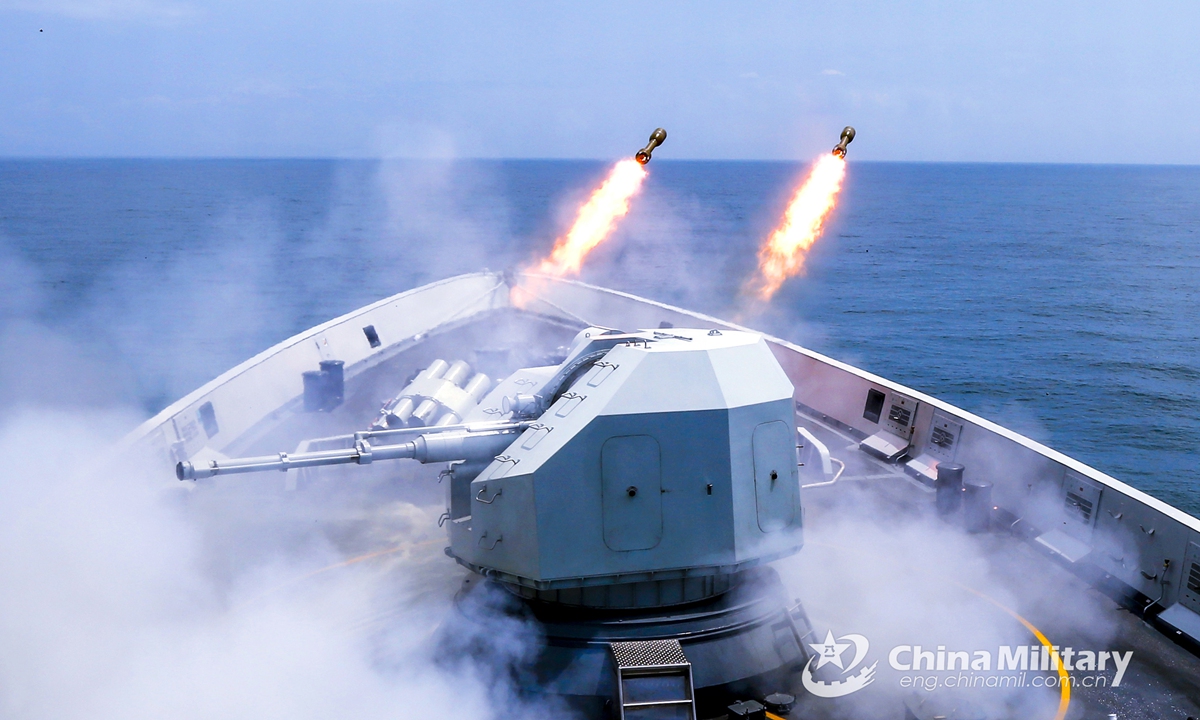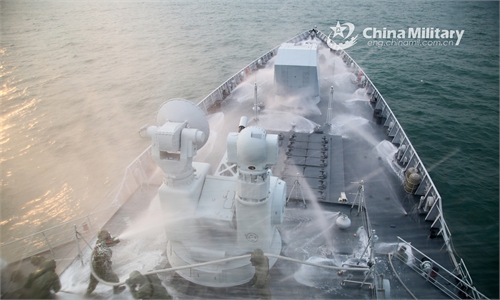
The guided-missile frigate Yulin (Hull 569) attached to a destroyer flotilla with the navy under the PLA Southern Theater Command fires its rocket-propelled depth charges at mock hostile submarine during a maritime training exercise in waters of the South China Sea in late March, 2020. The guided-missile frigates Xuchang (536) and Yulin (Hull 569) jointly execute maritime tasks on subjects including formation maneuver, live-fire operation, anti-submarine warfare (ASW) operation, joint salvage, etc.File photo:China Military
Japan, France, and the US will hold joint military drills on land and sea for the first time in May 2021, Japan's Sankei newspaper reported on Sunday.Also on Sunday, Japanese government sources told the Nikkei newspaper that the British navy will dispatch an aircraft carrier strike group to waters near Japan as early as next year. France is sending its navy for a joint drill in the Asia-Pacific region for the same reason that Britain will - to show its presence in the region.
The "America First" policy of US President Donald Trump has hurt relations between the US and its allies. As there will be a government transition in the US on January 20, 2021, Paris will take the chance to show its loyalty to the new administration in Washington by sending warships to the Far East and to demonstrate its support to the US' Indo-Pacific Strategy.
The UK and France are actually trying to huddle together with the US for warmth. The two European countries clearly know that their military strength is not enough for their global ambitions. So they want to expand their influence by borrowing plumes from Washington. From this perspective, their moves to send warships to the Asia-Pacific region are more symbolic than substantive.
In recent years, Japan has internationally accused China over territorial issues in both the East China Sea and the South China Sea. Tokyo wants to gain more support from non-regional countries in this regard by joining the Five Eyes intelligence-sharing alliance to further counter China.
Therefore, Japan is seen getting itself involved in military drills surrounding China, such as the Malabar naval exercises, and the Japan-France-US and Japan-UK-US joint exercises in 2021. All these reflect Tokyo's aim to rope in the US and its allies to back its illegal maritime claims and to contain China's development. But such goals will not be reached.
On the one hand, non-regional countries like Britain and France will come to the Asia-Pacific region with their own pursuits. They don't necessarily really support Japan's claims. The dispute between China and Japan over the Diaoyu Islands has long existed and China has sufficient evidence to prove that the islands have always been an integral part of the Chinese territory. It will not be in the interests of the UK and France to get themselves involved in this dispute to support Japan.
On the other hand, Britain and France also need to take stock of their own strength. China is no longer a country that can easily be bullied like the China it was 100 years ago. The days are also long gone when Western aggressors could occupy a country for hundreds of years by simply setting up a few cannons on a coast in the East. So if they ever provoke China again, they are bound to be countered promptly. They will lose more than they might gain. That's what they need to calculate carefully.
So it may be hard for Japan to get real support from Britain, France and even the US in its dispute with China over the Diaoyu Islands. Both London and Paris want to show their loyalty to Washington. Their support for Tokyo is nothing but a gesture. They know how much they can actually do.
Pierre Vandier, French navy chief of staff, said in October that the strategic space today is marked by an extremely rapid remilitarization of the sea, pointing his fingers at China. However, Vandier's "concern" with the international situation is actually hypocritical.
Britain announced in November a 16.5 billion pounds ($21.9 billion) surge in its defense spending. The investment will be used to upgrade equipment and military capabilities, especially with maritime operations. US Secretary of the Navy Kenneth Braithwaite also announced on Thursday that the US Navy is reconstituting the 1st Fleet. The moves of France, Britain and the US all aim to push for the militarization of the Asia-Pacific region. They are posing real threats, yet they call China a "danger."
China's national defense and military constitution is always developed in a defensive nature according to the country's established goals. China will not follow the military competition conducted by Western countries. It will instead strengthen the country's defense capabilities based on its own needs. Western countries should view China's military development with correct perspectives.
In history, countries such as Britain, France and Japan have left China with serious wounds from the two Opium Wars in the mid-19th century to the War of Resistance against Japanese Aggression (1931-45). What China is doing today is simply preventing such historical tragedies from taking place again. However, these countries, instead of reflecting on themselves, still provoke trouble in China's coastal waters. They should be ashamed of themselves.
The author is a senior research fellow at the PLA Naval Military Studies Research Institute. opinion@globaltimes.com.cn

